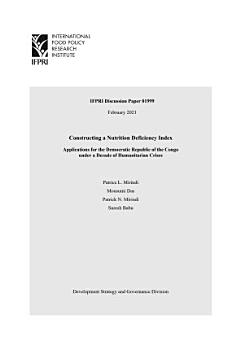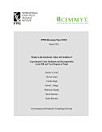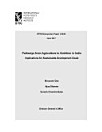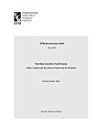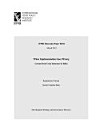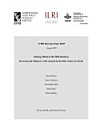Constructing a nutrition deficiency index: Applications for the Democratic Republic of the Congo under a decade of humanitarian crises
Mirindi, Patrice L. · Das, Mousumi · Mirindi, Patrick N. · Babu, Suresh Chandra
лют 2021 · IFPRI Discussion Paper Кніга 1 · Intl Food Policy Res Inst
Электронная кніга
50
Старонкі
family_home
Падыходзячыя
info
reportАцэнкі і водгукі не спраўджаны Даведацца больш
Пра гэту электронную кнігу
The Democratic Republic of the Congo (DRC) is perennially plagued by prolonged phases of poverty, conflict, and increased internal migration, as well as pandemic outbreaks such as Ebola and COVID-19, and limited livelihood opportunities. Such unexpected or catastrophic events have rendered households vulnerable and resulted in poor health outcomes. Given this background, we intend to analyze the nutritional profile of households for a period spanning almost a decade using the Household Consumption Expenditure Survey (HCES). We construct a composite nutrition deficiency index (NDI), capturing intake of 14 different macro- and micronutrients (which we refer to as dimensions)—namely, calories, protein, calcium, zinc, folate, thiamine, niacin, iron, vitamin A, vitamin B12, vitamin D, vitamin B6, vitamin C, and vitamin E—using the popular Alkire-Foster methodology. This methodology, usually used to construct multidimensional poverty indexes, in this case helps measure the incidence, intensity, and combined extent of multinutrient deprivation. DRC’s values on the multidimensional NDI vary regionally from 0.13 to 0.73. Urban DRC performs worse than rural DRC. Regions subject to the conflict and Ebola crises are the worst-affected of the nutritionally deprived regions. Deficiency in calorie and protein intake contributes to the highest values of the NDI, but we also find evidence of a double burden of malnutrition, with households lacking consumption of both macro- and micronutrients. South Kivu is the worst-performing of all regions and Mongala the best. The northern parts of DRC have fewer nutritionally deprived households, as compared with the central and southwestern parts. Our main policy recommendation is to help improve market access in urban areas so that people consume a more diverse diet. In rural areas, the government should support improving nutrition-sensitive agricultural production. Although the World Food Programme has a sustained presence in the country, uplifting households from severe hunger, active participation by the government and collaboration with multiple stakeholders is called for.
Ацаніце гэту электронную кнігу
Падзяліцеся сваімі меркаваннямі.
Чытанне інфармацыb
Смартфоны і планшэты
Усталюйце праграму "Кнігі Google Play" для Android і iPad/iPhone. Яна аўтаматычна сінхранізуецца з вашым уліковым запісам і дазваляе чытаць у інтэрнэце або па-за сеткай, дзе б вы ні былі.
Ноўтбукі і камп’ютары
У вэб-браўзеры камп’ютара можна слухаць аўдыякнігі, купленыя ў Google Play.
Электронныя кнiгi i iншыя прылады
Каб чытаць на такіх прыладах для электронных кніг, як, напрыклад, Kobo, трэба спампаваць файл і перанесці яго на сваю прыладу. Выканайце падрабязныя інструкцыі, прыведзеныя ў Даведачным цэнтры, каб перанесці файлы на прылады, якія падтрымліваюцца.
